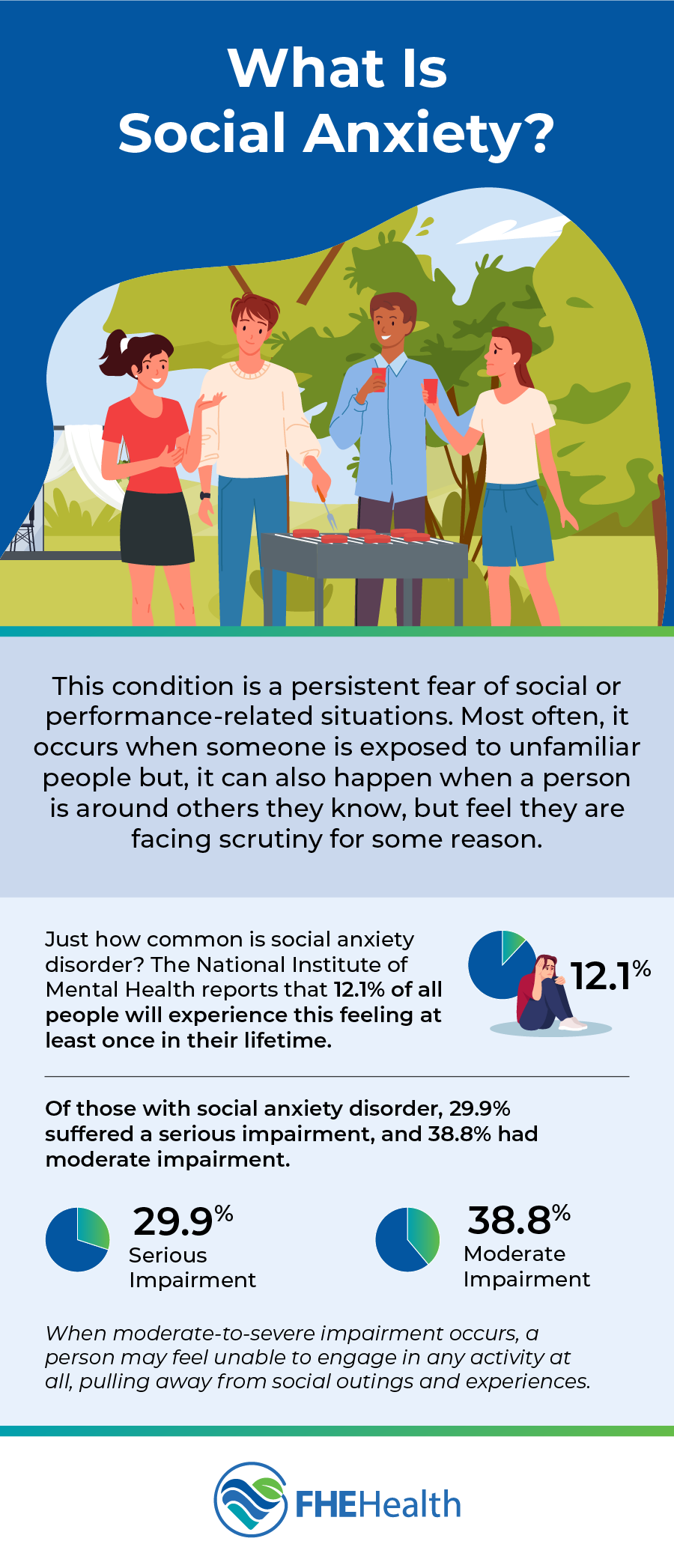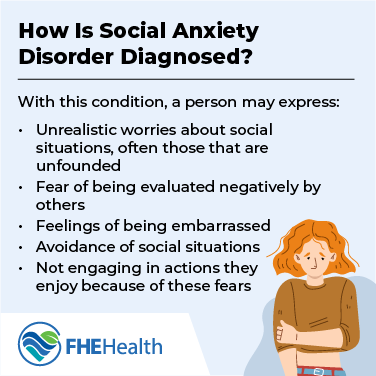Is social anxiety a mental illness? Most people get uncomfortable when they meet someone new or when they have to stand in front of a group and say something. For others, a debilitating feeling of panic rushes over them when they’re engaged in any type of social activity. This could be a social anxiety disorder, once known as a social phobia.
What Is Social Anxiety?
By definition, this condition is a persistent fear of social or performance-related situations. Most often, it occurs when someone is exposed to unfamiliar people. However, it can also happen when a person is around others they know, but feel they are facing scrutiny for some reason — either real or perceived. They feel they will act in some way to cause embarrassment or they will suffer anxiety-related symptoms that will lead to public humiliation.
Just how common is social anxiety disorder? The National Institute of Mental Health reports that an estimated 7.1% of the U.S. adult population has suffered some type of social anxiety disorder episode in the last year — about 8% of all females and 6.1% of all males. The study also notes that 12.1% of all people will experience this feeling at least once in their lifetime.
Of those with social anxiety disorder, 29.9% suffered a serious impairment, and 38.8% had moderate impairment. When moderate-to-severe impairment occurs, a person may feel unable to engage in any activity at all, pulling away from social outings and experiences.

How Is Social Anxiety Disorder Different from Other Anxiety Disorders?
Social anxiety disorder is a subset and a very specific form of anxiety disorder. Another form, called generalized anxiety disorder, impacts as many as 40 million people each year.
A person with generalized anxiety disorder may have symptoms such as nonstop worry, feeling anxious and physical responses to high-stress environments. What makes social anxiety disorder different from generalized anxiety disorder is the cause of these feelings and thoughts. Whereas a person with generalized anxiety disorder may be worried about things like strangers, money problems, self-expectations or emotional factors, those with social anxiety disorder have a very specific concern. They fear social-related experiences.
Causes of Social Anxiety
 The cause of social anxiety disorder isn’t fully understood. There is some indication that people with a family history of the condition may be at a higher risk. However, it’s often a learned experience.
The cause of social anxiety disorder isn’t fully understood. There is some indication that people with a family history of the condition may be at a higher risk. However, it’s often a learned experience.
Previous exposure to high-risk or high-stress social experiences that caused anxiety can create a higher likelihood of feeling the same way in future experiences. For others, social anxiety just always seemed to be present.
Some people are at a higher risk for this condition. Researchers have suggested some environmental and genetic factors can contribute to how likely a person is to develop social anxiety as well as how severe their condition will be. For example, a person who has a shy personality or who developed behavioral inhibitions during childhood may be at a higher risk.
Other reasons for this condition include exposure to negative life events and environmental exposure to trauma. This suggests that it may require treatment similar to post-traumatic stress disorder, a condition stemming from a previous traumatic incident. Those who have a history of other forms of anxiety, as well as those with family members with mental illness, may also be at risk.
Some physical health conditions can play a role in the development and onset of social anxiety disorder. Thyroid disorders and heart arrhythmia can be triggers. Caffeine and other substance use can also play a role in the development of the condition as well as in worsening it. This may happen, for example, if a person is worried that others will see their symptoms or that the stress of meeting someone new will trigger symptoms.
How Is Social Anxiety Disorder Diagnosed?
 Like most other anxiety disorders, diagnosis stems from monitoring a person’s actions in various situations. With this condition, a person may express:
Like most other anxiety disorders, diagnosis stems from monitoring a person’s actions in various situations. With this condition, a person may express:
- Unrealistic worries about social situations, often those that are unfounded based on previous experiences
- Fear of being evaluated negatively by others
- Feelings of being embarrassed
- Avoidance of social situations
- Not engaging in actions they enjoy because of these fears
To diagnosis this condition, doctors complete a physical exam to rule out any medical condition or medication that could be causing the symptoms. This includes looking at medications that can increase anxious feelings. They then talk about symptoms and feelings related to social events to get an idea of a person’s mental health. A list of the types of situations that make a person anxious is created to ensure it is specifically social-related and not generalized anxiety.
Family members are a rich source of insight. Most doctors or therapists want to see a list of symptoms that family members living in the home have identified as well as those the person themselves feel.
A formal diagnosis of social anxiety disorder occurs when symptoms match the definition in the Diagnostic and Statistic Manual of Mental Disorders. This includes:
- A clear indication of intense fear, anxiety or persistent concern over social situations due to the fear of being judged, embarrassed or otherwise humiliated
- Excessive worry that is outside of what could be considered normal for the situation
- Avoidance of activities that bring on these feelings or that worsen them
- Anxiety so significant that it impacts the way a person lives their life
- No other explanation for the anxiety is possible
The Effects of Living With Social Anxiety Disorder
Living with social anxiety disorder can affect relationships, work and school. It can force a person to feel as though they can’t participate in things that they enjoy, impacting their quality of life. It can also lead to low self-esteem.
Over time, those predisposed to develop depression may experience frequent episodes of untreated social anxiety disorder.
Social Anxiety Quiz
Learn what social anxiety is and take our short self-assessment quiz. It can help you determine if you’re experiencing signs of social anxiety disorder.
Can Social Anxiety Be Treated?
Can you cure social anxiety disorder? This is a question many people ask if they know they have this condition. That’s because it can impact many facets of daily life, especially if a person doesn’t receive treatment or begins to simply not engage in activities.
Treatment for social anxiety disorder is possible. It’s much like that for treating anxiety disorders overall. However, there’s also the importance of social engagement. Exposure therapy, in which a person participates in social activities at a controlled rate, is often necessary.
Co-Occurring Disorders With Social Anxiety Disorder
People with this type of anxiety may be more likely to use drugs and alcohol as a coping method. Some people with this disorder are so worried about how they may act when using drugs or alcohol that they abstain from. Others see the use of drugs as a way to relax and unwind.
A person can develop a substance use disorder because they are trying to mask their symptoms. This may include having a drink before being able to get up to speak or taking a stimulant before being able to join a group.
Finding Help for Social Anxiety Disorder at FHE Health
Providing a wide range of solutions for those with mental health disorders, FHE Health can help you with social anxiety disorder. For treatment options and to learn more, call FHE Health counselors at 833-596-3502.








